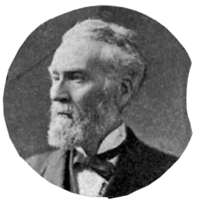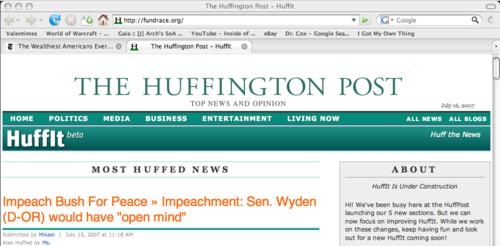As a graduate of the Medill School of Journalism, I’m here to tell you that the biggest mistake you’ll hear at that school will likely come on the first day you’re there. (That’s Joe Medill at right, a real 19th century man.)
Someone will call it a profession.
Journalism is not a profession. Journalism is a trade. Just like cooking is a trade, and plumbing, and tree surgery. That is, journalism is a market process and no journalist — no matter what they think or what some asshat "professor" tells them — stands above or apart from the market.
I was fortunate that, in my time at Medill, we had a few teachers who understood this and emphasized it. Ben Baldwin chided anyone who dared call him "professor" or (worse) "doctor" — noting he only had a master’s. Dick Schwarzlose got it. Elizabeth Yamashita introduced her business journalism class by giving us the "good news" that "you’re all going to get jobs."
The canard that journalism is a profession came from, among others, Mr. Medill. Along with Mr. Pulizer, whose name is on the Columbia school, and Mr. Annenberg, whose name adorns USC’s school. None of these men were journalists. They were businessmen. And their claim that journalism is, or ever was, a profession was designed merely to keep the workers in their places, which was (and is) under the thumb of the boss.
Notice. Those who work for established publishers are deemed members of the profession. Those who don’t aren’t, unless they’re freelancing for the same established publishers.
One other way in which this monopoly disguised as profession was
maintained was through the Associated Press. The AP is a cooperative
owned by its member newspapers. It pulls most of its stories from those
newspapers, and tightly controls what can happen to that work. The AP
does this, and has done this, in order to maintain the "monopolies" its
members claim in their respective districts. It’s a syndicate all right
— a crime syndicate.
But here’s the problem with crime syndicates, no matter their
provenance, and no matter their purpose. They’re fat. They’re lazy.
They’re dinosaurs.
As we have seen in the Internet age. The latest example is the idea that bloggers can’t quote their stories. The predictable result being bloggers won’t link to them either.
What should AP have done instead?
- Add top bloggers as AP affiliates, under the same terms as newspapers.
- Go to video quicker, organizing newspapers’ video staffs and publicizing their work.
- Seek out good blog posts and offer to syndicate them, on a post-by-post basis.
- Collect, and publicize, the number of trackbacks and links its stories receive.
- Extend these policies to Facebook, MySpace, anywhere the market exists.
The idea would be to extend AP’s reach, not limit it, to extend its
circulation, not reduce it, and to enhance its coverage, not narrow it.
I wonder when a large Internet-based media business (like The
Huffington Post) might get a Clue and run with this kind of business
model? I’m just asking.












